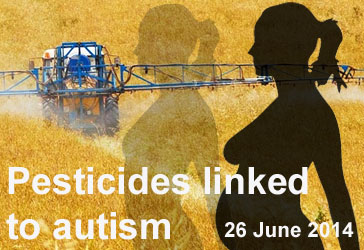Check out other stories from the Latest News
Pesticide Exposure Linked to Increased Risk of Autism
By Shana R. Spindler, Ph.D. on June 26, 2014

Background: Past studies have generated concerns regarding pesticide exposure during pregnancy and developmental delays in the child. But what role does pesticide exposure have, if any, in autism?
News Brief: Exposure to certain types of agricultural pesticides during or slightly before pregnancy may increase a woman’s risk of having a child with autism, according to a study published this month by University of California researchers. The team of scientists followed 970 participants as part of the Childhood Autism Risks from Genetics and Environment (CHARGE) Study. The researchers compared commercial pesticide application data with the addresses of study participants and found that those living near the application of organophosphates, a type of pesticide that affects how neurons function, were 60 percent more likely to have a child diagnosed with autism. Study participants living near the use of pyrethoid insecticides, a common type of insecticide that also affects insect nerve cells, showed increased risk for both autism and developmental delay.
Why it's important: It is important to recognize that this study shows correlation, not causation. The increased risk of autism in children whose mothers reside near pesticide application may or may not be due to the pesticides themselves, but other factors that are common in families who live near agricultural sites. Certainly, the study supports a closer examination of pesticide exposure and the ballooning rates of autism diagnosis.
Help me understand :
| Source(s) : |
| Tweet |

